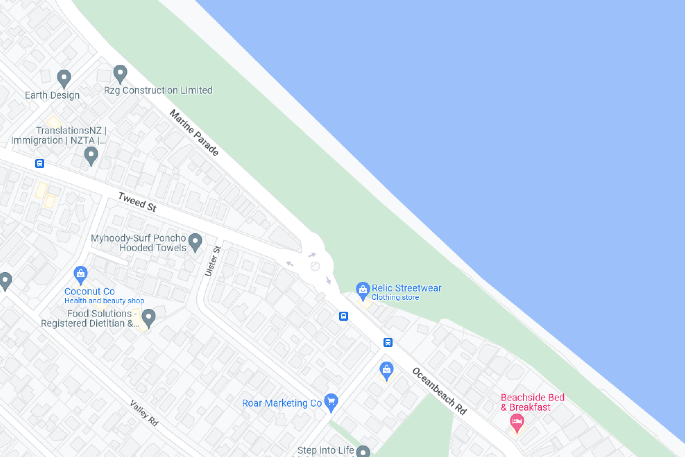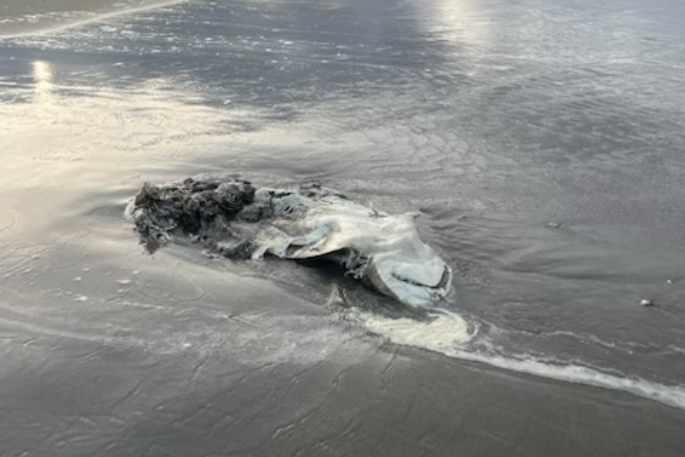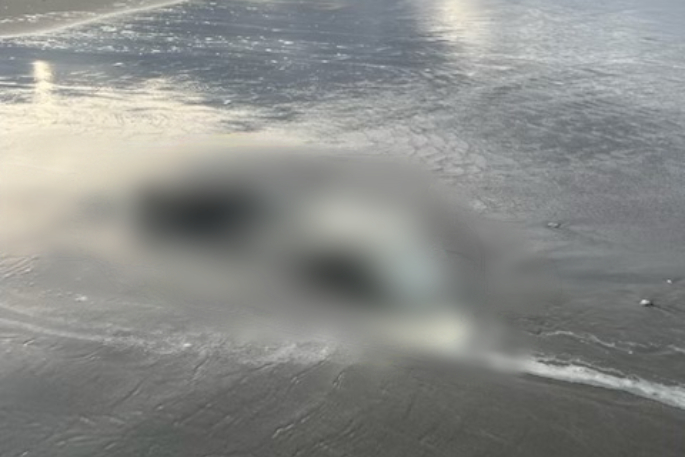Warning: Caution is advised in reading this story. The above photo has been blurred out as some people may find it distressing. The photo can be viewed in full at the bottom of the story if you choose to.
A carcass of a great white shark washed up on Tauranga's shores this week.
It was first spotted by local surfer Tao Mouldey, who says he had it 'pointed out to him” by a friend's dad on the evening of Wednesday, September 27.
"It was just lying on the beach at about 6pm. It freaked me out a bit. I was a bit hesitant to get back out in the water,” says Tao.
"You hear about sharks a lot more out at Matakana, but not at the main beach."
The shark was missing its tail according to multiple people who sighted the great white.
Waikato University researcher Phil Ross says the missing tail could indicate the shark had been attacked by an orca, but could not be 'completely certain” without seeing the carcass himself.
This comes as an orca pod was recently spotted in the Tauranga Harbour earlier this week.
'I went down last night as soon as I could. I walked up and down the beach to see it for myself but it seems as though it had washed away,” says Phil.
Phil says from the look of the photos he received from local beach goers, the great white was "pretty decomposed" at the time of it washing up on the shore.
"It was discovered around the Oceanbeach Road and Marine Parade roundabout. I would have been pretty keen to take a look at it."
 The great white shark was discovered washed up on Tauranga's shores near the Oceanbeach Road and Marine Parade roundabout. Image: Google Maps.
The great white shark was discovered washed up on Tauranga's shores near the Oceanbeach Road and Marine Parade roundabout. Image: Google Maps.
'Sharks of this nature are amazing for research. We're currently conducting a long term study on shark population after an increase in sightings and this would have been perfect for that.”
"The white shark research programme that we have put together is a collaboration between the hapū in Tauranga harbour, shark experts from the Department of Conservation and other organisations around the country.
"There has been an increase of interactions between people and sharks. We want to know what is happening with the shark population and whether we are seeing a increase of shark population in Tauranga's Harbour or if it is a case of having more people in and around the water.
"From some of the underwater camerawork we have done, we identify individual sharks, estimate their size, sex and paint a picture of what the shark population looks like.
"From this shark that washed up on the shore, it would have been great to get some pictures or study it to see if we can match it up to one of the sharks we have pictures of, or find out if it is a new shark.
"We could have also seen if it was born here or migrated here and understand how this shark connects to the wider shark population here and in the rest of the country."
Phil says his initial assumption is the shark population has increased.
"It is very hard to say, and scientists are always very reluctant to draw conclusions too early. This research is a long term project."
Phil adds that despite the increased reports of sharks in Tauranga's waters, he would 'still feel comfortable” swimming with his family.
"Sharks have always been here. It's not a cause for concern, however what we should keep in mind is being sensible about how we go into the ocean. We should not mix or swim nearby where people are fishing with burly trails.
"If a shark is following a burly trail with a purpose of finding food at the end of that trail, I would not want to be at the end of the trail.
"It's about having a good separation between fishing and people."
Phil says if anyone discovers a shark washed up on the shore, they should reach out to DOC or contact him by email at [email protected].
"If people are able to send through the location of any shark remains along with when it was found, hopefully someone on our team is able to get down there pretty quickly, collect the remains, and contribute to more research to further understand what is going on in our waters."
 The carcass was discovered on Wednesday, September 27. Photo: Tao Mouldey/Supplied.
The carcass was discovered on Wednesday, September 27. Photo: Tao Mouldey/Supplied.



1 comment
No-one...
Posted on 30-09-2022 11:39 | By morepork
... has ever been killed by a shark attack on land... Understand the risks and be respectful if you enter their domain.
Leave a Comment
You must be logged in to make a comment.